Samantha’s Story: When Perseverance and Advocacy Pays Off
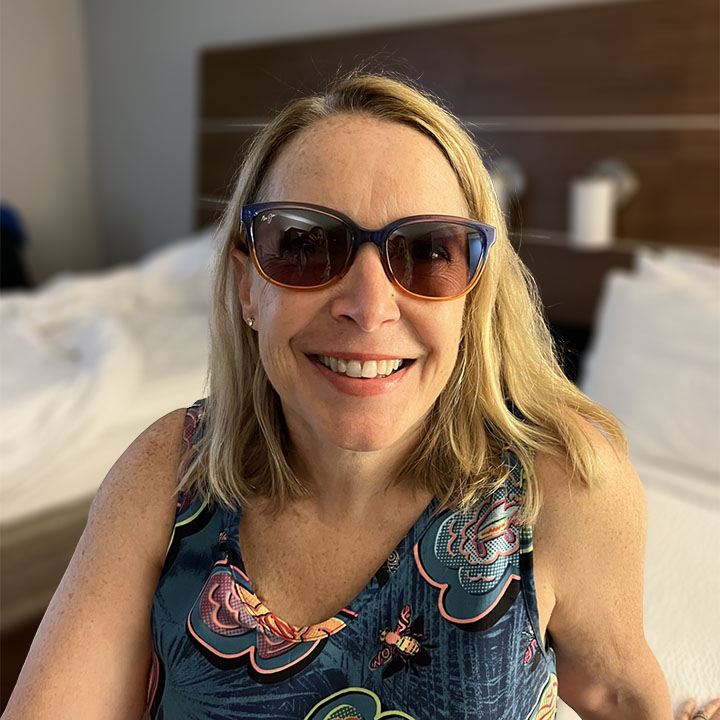
Samantha Levine, a philosophy professor and dedicated volunteer, was used to a full and active life. Living in Roswell, Georgia, she had been teaching philosophy for nearly two decades, 17 years at Armstrong State University in Savannah and one year at Georgia State University, where she engaged students in deep discussions about life’s fundamental questions. Beyond the classroom, Samantha was also committed to giving back to her community through her work with the Assistance League, a nonprofit organization. “I loved being a professor and working with the Assistance League. Both gave me a sense of purpose,” Samantha shared.
Her life, however, took a sudden turn when she was diagnosed with HER2-positive breast cancer in March 2024. Until that point, Samantha had been remarkably healthy. “I wasn’t on any medications and rarely even took Advil,” she explained. She exercised regularly, maintained a decent diet and had no family history of cancer. The diagnosis came as a complete shock.
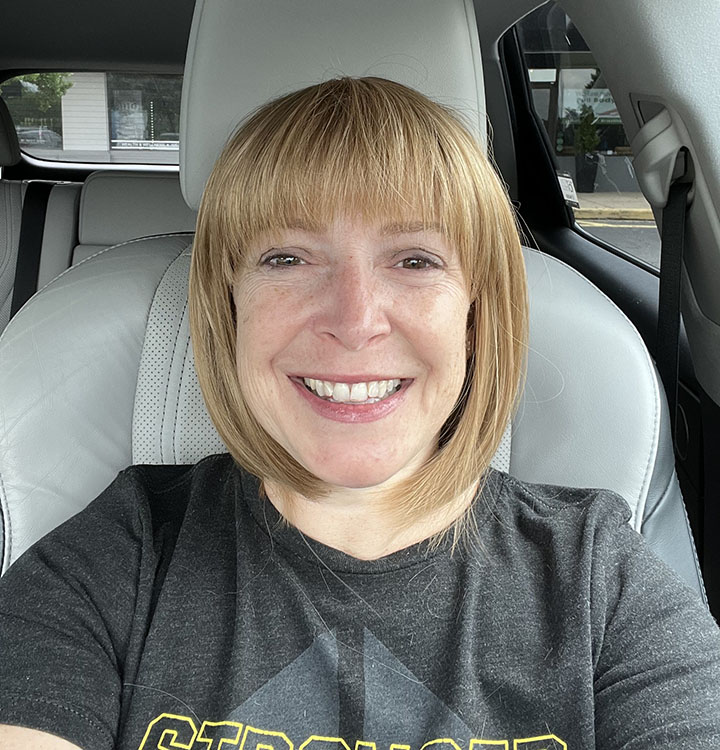 It all started with a routine mammogram; one she hadn’t done in three years. A week after the scan, Samantha received a call to come back for another screening, but the medical team assured her that it was likely nothing serious. Then, while taking a shower after a workout, she felt a lump near her armpit. “It felt significant, not as big as a golf ball, but definitely noticeable,” she said. Alarmed, Samantha called her doctor immediately, advocating to be seen as soon as possible despite being told she would have to wait a couple of weeks.
It all started with a routine mammogram; one she hadn’t done in three years. A week after the scan, Samantha received a call to come back for another screening, but the medical team assured her that it was likely nothing serious. Then, while taking a shower after a workout, she felt a lump near her armpit. “It felt significant, not as big as a golf ball, but definitely noticeable,” she said. Alarmed, Samantha called her doctor immediately, advocating to be seen as soon as possible despite being told she would have to wait a couple of weeks.
Her persistence paid off. A biopsy confirmed her worst fears: she had breast cancer. “I was petrified. It was like a jolt to the system,” she recalled. Samantha, who had always been the caregiver and advocate for others, now found herself having to fight for her own health.
From the moment of her diagnosis, Samantha became her own biggest advocate. “I pushed to get tests done and appointments moved up,” she said, noting that navigating the healthcare system was nothing short of a challenge.
At first, she struggled to find an oncology practice who would take her insurance, but after some persistence, she was led to Cancer and Blood Specialists of Georgia, a decision she describes as a stroke of luck. “I couldn’t have asked for a better place to be treated at. It was a blessing in disguise,” she added.
For Samantha, receiving the diagnosis of invasive breast cancer was an overwhelming and life-altering moment. The weight of knowing the journey ahead would involve surgery, chemotherapy and potentially years of treatment was heavy, but throughout it all, she chose to stay positive. Despite the emotional and physical toll, she focused on staying hopeful and believing that there is light at the end of the tunnel.
According to the American Cancer Society, breast cancer is the most commonly diagnosed cancer among women in the United States. This year, more than 300,000 women are expected to receive a breast cancer diagnosis. Samantha’s breast cancer is localized, meaning it has not spread to other parts of her body, and this type has the highest survival rate.
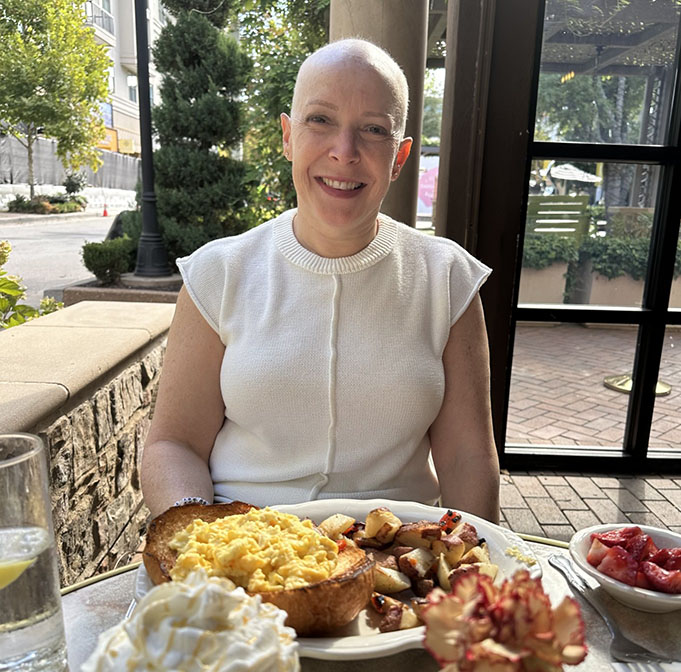
Samantha’s treatment plan was aggressive. She underwent six rounds of chemotherapy, each session spaced three weeks apart. She described the physical toll it took on her body, from losing her hair to chronic fatigue. “By the third round, I was in bed more than I was awake, sleeping up to 18 hours a day,” she said. Despite her fears about how much worse it could get, she pushed through each session with determination. “My fourth and fifth treatments weren’t as bad as I expected. By the end, I could feel myself starting to recover, but it was a slow process.”
Samantha’s treatment plan was challenging but she responded well. After completing six cycles of TCHP — a regiment of docetaxel, carboplatin, trastuzumab and pertuzumab — she reached a remarkable milestone: a complete response. Achieving this with neoadjuvant therapy, especially with TCHP, which targets HER2-positive breast cancer, significantly reduces the risk of recurrence and improves long-term outcomes.
The next critical step in her journey was surgery, which went smoothly and added confidence to her recovery. Now, with that phase behind her, she is completing one year of adjuvant HP therapy (trastuzumab and pertuzumab) to further reduce the risk of recurrence. Of course, long-term follow-up will be essential, as recurrence can still happen despite optimal treatment. However, with the current response and therapy, her prognosis looks very hopeful for a good outcome and long-term disease control.
The physical changes were hard to accept. Losing her hair, in particular, was an emotional challenge. “I didn’t realize how much vanity I had tied to my hair until it was gone,” Samantha admitted. Although friends and family complimented her for how great she looked bald, she struggled with her appearance. “At the same time, I didn’t want to hide it either. It was a strange battle between accepting how I looked and feeling self-conscious about it.”
Her support system played an invaluable role throughout her journey. Samantha’s three sisters, along with her father and close friends, rallied around her from the very beginning. “They were there for every chemo session,” she said. “One sister would come, then my dad, then a friend. I never went through this alone.” Her husband Jack and two stepdaughters Alexa and Zoe were also by her side throughout the entire process. Alexa even surprised Samantha with shirts that read “#TeamSam” and “Her Fight is Our Fight,” which the entire family wore proudly on her first round of chemo. In addition to her family, she was surrounded by a tight-knit group of friends from her neighborhood in Roswell, who helped her emotionally and physically through the hardest days.
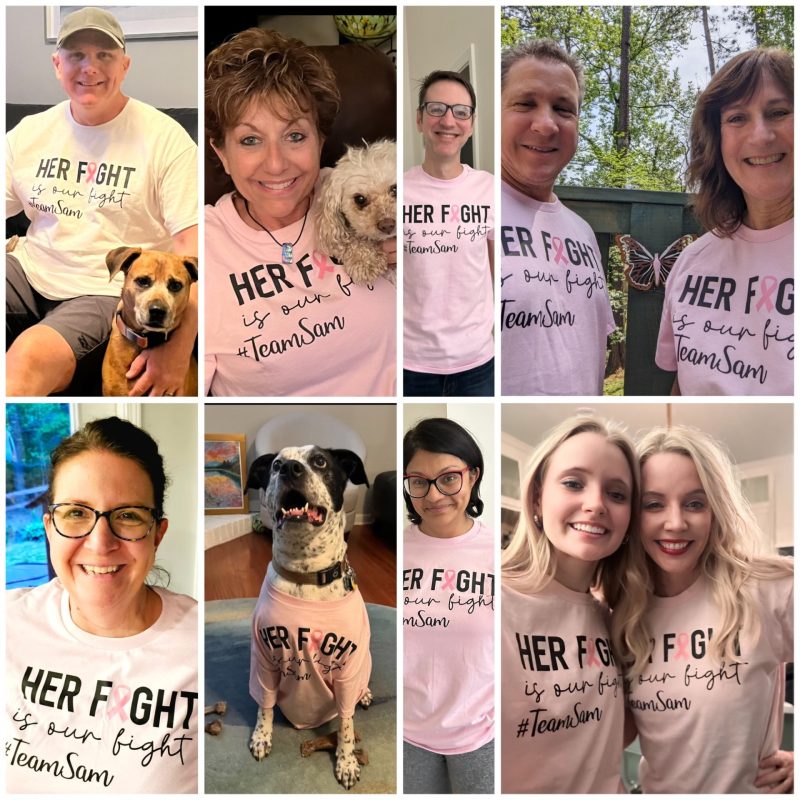 Samantha faced not only the physical demands of chemotherapy but also the emotional strain of explaining her condition to those closest to her. “One of the hardest things was communicating what I needed to my husband,” she revealed. Although well-meaning, Samantha found that her husband sometimes struggled to fully grasp the extent of her exhaustion and physical limitations. “I had to be clear with him about what I could and couldn’t do — like walking our dog, which I simply didn’t have the strength for,” she explained. “It wasn’t easy, but it was necessary to have these conversations.”
Samantha faced not only the physical demands of chemotherapy but also the emotional strain of explaining her condition to those closest to her. “One of the hardest things was communicating what I needed to my husband,” she revealed. Although well-meaning, Samantha found that her husband sometimes struggled to fully grasp the extent of her exhaustion and physical limitations. “I had to be clear with him about what I could and couldn’t do — like walking our dog, which I simply didn’t have the strength for,” she explained. “It wasn’t easy, but it was necessary to have these conversations.”
Two weeks ago, Samantha underwent surgery to remove the remaining cancer, a major milestone in her journey. The next step will be an infusion of targeted therapies to ensure the cancer doesn’t return, followed by radiation. The process has been long and grueling, but Samantha remains hopeful. “I’ll finish my treatment in June 2025, and I’m looking forward to putting this chapter behind me,” she said.
Throughout the ups and downs, Samantha has maintained a strong sense of resilience and self-advocacy, qualities she didn’t fully recognize in herself before the diagnosis. “I’ve always been someone who stands up for others, but not necessarily for myself. Cancer forced me to become my own biggest advocate, and I’m proud of that,” she reflected. Friends and family have commended her for her bravery and positive outlook, although Samantha admits she didn’t always feel that way. “I was just doing what I had to do to get through it,” she said humbly.
What makes Samantha remarkable is the strong support system she has around her. Her family is incredibly loving, and their encouragement has played a big role in helping her stay positive throughout her journey. That sense of community and support, combined with her own strength, has allowed her to approach each step of her treatment with grace and resilience.
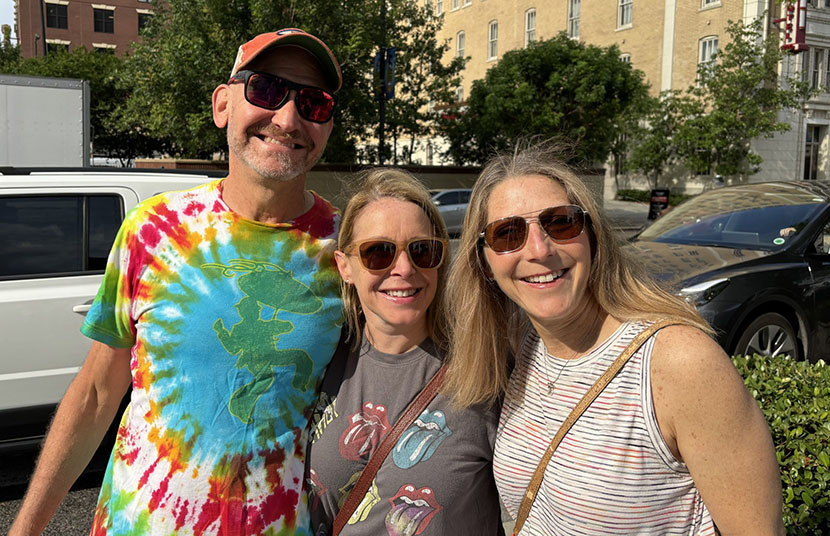
Samantha’s advice for anyone facing a cancer diagnosis is simple but powerful: “Trust yourself and your body. You know yourself better than anyone else.” She believes that while it’s important to lean on doctors and medical professionals, listening to how your own body responds to treatments is equally critical. “It’s a personal journey, and everyone reacts differently. Be your own advocate and trust your instincts,” she emphasized.
As Samantha reflects on the past months, she is grateful not only for the medical team that guided her through treatment but also for the newfound appreciation she has for her health and strength. “I never thought I’d be looking forward to going for a run again, but here I am, waiting for the day my body is ready,” she said with a smile
